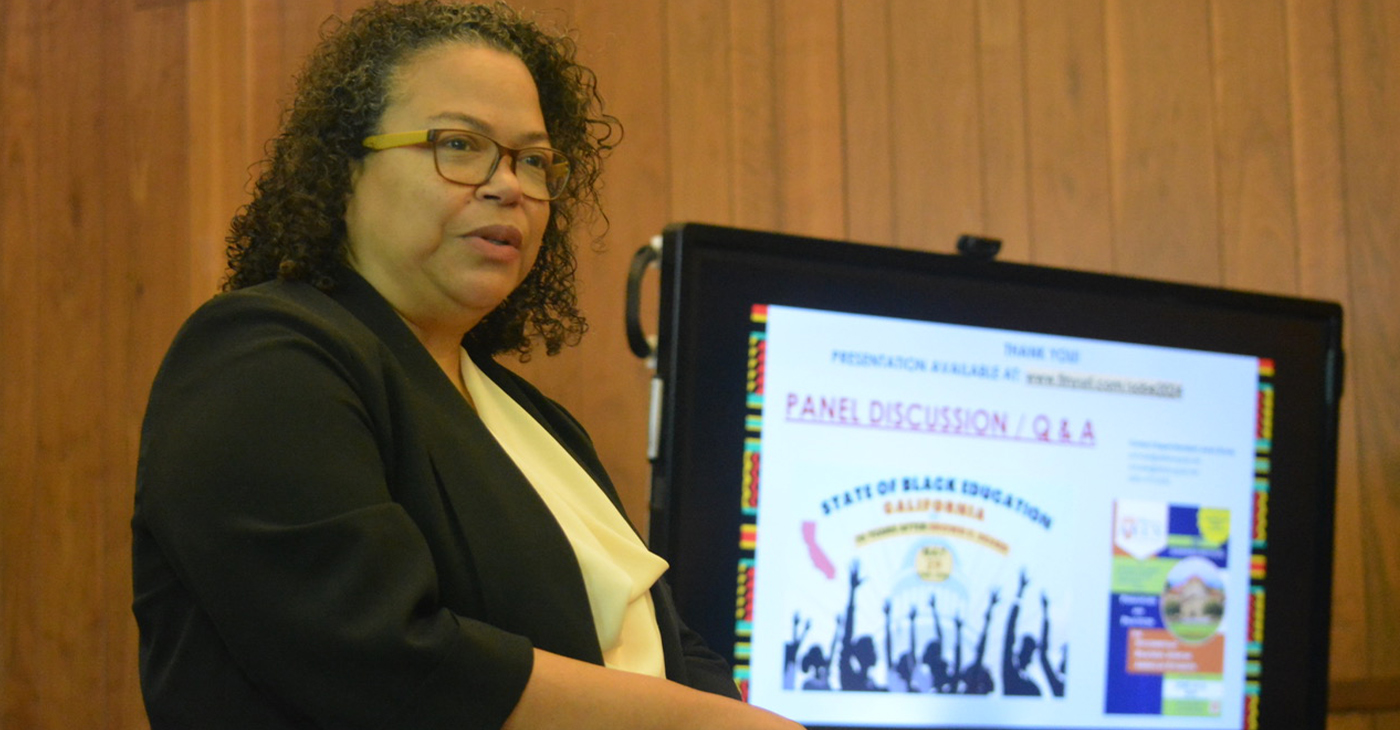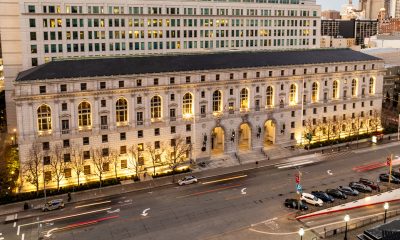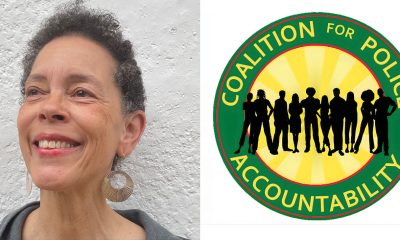Community
California Split Over Vote That Could Raise Some Property Taxes

Proposition 15, the “Tax on Commercial and Industrial Properties for Education and Local Government Funding Initiative,” is on the Nov. 3 ballot in California.
If Californians vote yes on “Split Roll” — shorthand for the proposition’s title — the state will come up with a new taxation formula. The constitutional amendment would require counties to levy higher real estate taxes on businesses and industrial buildings than it does on residential homes.
The initiative has caused proponents and opponents in the Black community to draw battle lines. Each side has dug in, pointing to the benefits or the dangers of Prop. 15 in opposing efforts to win the hearts, minds and votes of African Americans and other Californians. If passed, Prop. 15 would overturn Prop. 13, a provision that has for 42 years now placed a hard limit on how much tax can be assessed on any property in the state. “The property tax hike on the November ballot will hurt minority communities — causing more gentrification, killing jobs, and increasing the cost of living for working families. We are proud to stand in opposition to the largest property tax increase in state history,” said Alice Huffman, president of the California-Hawaii Conference of the National Association for the Advancement of Colored People (NAACP).
“Despite the grand illusion presented by the initiative’s proponents, no protections exist to ensure a dime of these tax dollars is actually spent on helping lift our communities out of poverty,” Huffman continued.
San Francisco Mayor London Breed supports Prop 15, which would fund local governments in the state as well as provide more cash for public schools and community colleges.
“When I look at our dire budget deficits over the next couple of years, and then I see these revenue estimates showing how much we can invest in our community without having to raise any taxes on residents, it makes it more important for me to give my full support on this initiative,” Breed said.
The California Legislative Analyst Office estimates that, upon full implementation, the ballot initiative would generate between $8 billion and $12.5 billion in revenue per year. Of that projected revenue, 40 % would be allocated to schools. The other 60% would fund local government.
A few prominent African American opponents of the initiative are Huffman; former state Assemblymember Gwen Moore; former state Sen. Roderick Wright; former state Assembly Speaker Willie Brown, who was also a former mayor of San Francisco; and the Rev. Amos C. Brown, president of the San Francisco branch of the NAACP.
The politicians, former and current, have picked their sides. But the power to decide whether or not commercial and industrial properties should be shielded like residential properties are by Prop. 13 lies in the hands of California’s voters.
In 1978, voters in the state approved Prop. 13, which required that residential, commercial and industrial properties be taxed based on their purchase price. Under that constitutional amendment, taxes are limited to no more than 1 % of the purchase price (at the time of purchase), with an annual adjustment equal to the rate of inflation or 2%, whichever is lower.
In California, market values tend to increase faster than 2% per year, meaning the taxable value of commercial and industrial properties is often lower than the market value, according to the state Legislative Analyst’s Office.
The change from the purchase price to market value would be phased-in beginning in the fiscal year 2022-2023. Properties, such as retail centers, whose occupants are 50% or more small businesses would be taxed based on market value beginning in the fiscal year 2025-2026 (or at a later date that the Legislature decides).
The ballot initiative would make an exception for properties whose business owners have $3 million or less in holdings within California. These properties would continue to be taxed based on their purchase price.
Activism
Oakland Post: Week of June 12-18, 2024
The printed Weekly Edition of the Oakland Post: Week of June 12-18, 2024

To enlarge your view of this issue, use the slider, magnifying glass icon or full page icon in the lower right corner of the browser window. ![]()
Antonio Ray Harvey
More Segregated Than Deep South: ACLU Releases Report on Calif. Public Schools
The 2024 State of Black Education: Report Card was recently published by the American Civil Liberties Union California Action (ACLU California Action). It states that California is the third most segregated state for Black students. Co-author of the report, policy counsel Amir Whitaker from ACLU Southern California explained the criteria the ACLU use to rank California during the commemoration of the 70th anniversary of the landmark 1954 U.S. Supreme Court decision Brown vs. Board of Education held at the State Capitol the day after the Memorial Day holiday.

By Antonio Ray Harvey, California Black Media
The 2024 State of Black Education: Report Card was recently published by the American Civil Liberties Union California Action (ACLU California Action).
It states that California is the third most segregated state for Black students.
Co-author of the report, policy counsel Amir Whitaker from ACLU Southern California explained the criteria the ACLU use to rank California during the commemoration of the 70th anniversary of the landmark 1954 U.S. Supreme Court decision Brown vs. Board of Education held at the State Capitol the day after the Memorial Day holiday.
“For every state in the Deep South, California (schools) are more segregated,” Whittaker said. “People often think that California is not segregated or unequal as Deep South states and others. The inequalities here (in California) are actually wider.”
New York and Illinois are ahead of California regarding the racial diversity of their student bodies. According to a report May 2022 report by Stanford Graduate School of Education, the Los Angeles, Philadelphia, and New York City school districts are in the top 10 most racially segregated districts for White-Black, White-Hispanic, and White-Asian segregation based on the average levels from 1991-2020.
In bigger school districts, segregation between low-income (students who are eligible for free lunch) and non-low-income students increased by 47% since 1991, according to the Stanford Graduate School’s report.
“That’s why it’s important to look at this data,” Whitaker said. “When you have millions of people living in places like Los Angeles, Chicago, and New York, the urban areas are a lot more segregated than the south. That’s a big part of it.
A number of factors contribute to the segregation of schools in California such as parents sending their children to private schools, others optioning for homeschooling, and other reasons, Whitaker said.
The Brown v. Board of Education case declared that separating children in public schools based on race was unconstitutional. However, Whitaker pointed to cases after the landmark decision that circumvented that federal law.
According to a 2014 report by the Civil Rights Project, in the 1990s, decisions by the U.S. Supreme Court decision ended federal desegregation orders in San Francisco and San Jose. In addition, court decisions in the state that ordered desegregation in the 1970s were overturned by the 1990s. Legally, California has no school integration policy to adhere to.
“This is why we did this report. There needs to be a report just on this issue (of school segregation),” Whitaker told California Black Media. “Right now, there’s no task force or anything addressing it. I have never seen the California Department of Education talk about it. This is a pandemic (and) a crisis.”
ACLU Northern California hosted an overview of the report and panel discussion at the State Capitol on May 29. California Black Legislative Caucus member Assemblymember Mia Bonta (D-Alameda) and Sen. Steven Bradford were the guest speakers. Parents, students, educators, and Black education advocates from all over the state attended the 90-minute presentation at the State Capitol.
School segregation is the No. 1 issue listed in among the report’s “24 areas of documented inequality,” along with problematic trends of racial harassment, a continuous decline of Black student enrollment, school closures, connection with school staff, chronic absenteeism, low Black teacher representation, and parent participation.
Art
Mayor Breed, Actor Morris Chestnut Attend S.F.’s Indie Night Film Festival
On June 1, the acclaimed Los Angeles-based Indie Night Film Festival arrived at the Kabuki Theater in San Francisco. San Francisco native Dave Brown, Founder and CEO of the Indie Night Film Festival, has a vision for the film industry that is squarely focused on promoting the many talented producers, actors, and designers contributing to this billion-dollar industry. The festival has been running for 12 years and it’s only up from here, he says.

By Y’Anad Burrell
On June 1, the acclaimed Los Angeles-based Indie Night Film Festival arrived at the Kabuki Theater in San Francisco.
San Francisco native Dave Brown, Founder and CEO of the Indie Night Film Festival, has a vision for the film industry that is squarely focused on promoting the many talented producers, actors, and designers contributing to this billion-dollar industry. The festival has been running for 12 years and it’s only up from here, he says.
A weekly celebration of cinematic artistry designed to elevate emerging talent while providing a platform for networking and collaboration, entrepreneur Dave Brown created Indie Night to bridge gaps within the filmmaking community by fostering connections between like-minded individuals worldwide. The Indie Film Festival currently has over 450 film submissions worldwide, and its cinematic vault only continues to grow.
The festival showcased over 10 short films and trailers, and featured Faces of the “City: Fighting for the Soul of America,” produced by veteran actor Tisha Campbell. This film is about the vibrancy and legacy of San Francisco. The festival also previewed “When It Reigns,” a trailer by Oakland’s burgeoning filmmaker Jamaica René.
Indie films have not just challenged traditional cinematic norms; they’ve shattered them. These films offer unique storytelling perspectives and push creative boundaries in truly inspiring ways. With their smaller budgets and independent spirit, they often tackle unconventional subjects and portray diverse characters, providing a refreshing alternative to mainstream cinema. As a result, indie films have resonated with audiences seeking an escape from formulaic blockbusters and are increasingly celebrated for their authenticity and originality.
Organizers say the mission of Indie Night is to elevate the craft of independent artists and creators. It also provides a venue for them to showcase their work, network, and exchange information with new and established creatives. It creates a community that values and supports independent art.
For more about the Indie Night Film Festival, visit www.indienightfilmfestival.com.
-

 Business4 weeks ago
Business4 weeks agoCal. Supreme Court Could Strip Gov and Legislature of Power to Raise Taxes
-

 California Black Media4 weeks ago
California Black Media4 weeks agoActivist and Organizer Peggy Moore and Wife Die in Fatal Car Crash
-

 California Black Media4 weeks ago
California Black Media4 weeks agoExpect to See a New Flat Rate Fee of $24 on Your Electricity Bill
-

 Bay Area4 weeks ago
Bay Area4 weeks agoOakland International Airport Will Now Be Called ‘San Francisco Bay Oakland International Airport’
-

 Bay Area4 weeks ago
Bay Area4 weeks agoRadical Proposal to Limit the Power of Oakland’s Police Commission
-

 Business4 weeks ago
Business4 weeks agoBanning Menthol Cigarettes: California-Based Advocacy Group Joins Suit Against Federal Govt.
-

 Alameda County4 weeks ago
Alameda County4 weeks agoAlameda DA Pamela Price is Ready to ‘Protect the Win’ in Upcoming Recall Election
-

 Arts and Culture4 weeks ago
Arts and Culture4 weeks agoThird Annual Town Up Tuesday Lifts Oakland’s Community, Culture and Joy























































